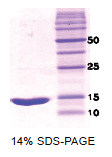CD305 / LAIR1 (22-125) Human Protein
CAT#: SA6036X
CD305 / LAIR1 (22-125) human protein, 0.5 mg
|
Need it in bulk or customized? Get a free quote |
CNY 17,930.00
货期*
详询
规格
Specifications
| Product Data | |
| Species | Human |
| Expression Host | E. coli |
| Expression cDNA Clone or AA Sequence |
MQEEDLPRPS ISAEPGTVIP LGSHVTFVCR GPVGVQTFRL ERESRSTYND TEDVSQASPS ESEARFRIDS VSEGNAGPYR CIYYKPPKWS EQSDYLELLV KETSG
|
| Predicted MW | 11.7 kDa |
| Concentration | lot specific |
| Purity | >95% by SDS-PAGE |
| Buffer | Presentation State: Purified State: Liquid protein |
| Preparation | Liquid protein |
| Protein Description | LAIR-1 is a glycoprotein (~32kDa) expressed on the surface of the majority of human peripheral blood mononuclear leukocytes including T cells , B cells, NK cells, macrophages and dendritic cells. LAIR-1 functions as an inhibitory receptor in NK cells, T cells and B cells. Lair-1 consists of a leader sequence, extracellular domain, transmembrane domain, cytoplasmic region. The extracellular domain of LAIR-1 (22-125aa) was overexpressed in E.coli, and purified by using conventional chromatography techniques. |
| Storage | Store at 2 - 8 °C for up to one month or (in aliquots) at -20 °C. Avoid repeated freezing and thawing. |
| Stability | Shelf life: one year from despatch. |
| Reference Data | |
| RefSeq | NP_001275952 |
| Locus ID | 3903 |
| UniProt ID | Q6GTX8 |
| Cytogenetics | 19q13.42 |
| Synonyms | CD305; LAIR-1 |
| Summary | The protein encoded by this gene is an inhibitory receptor found on peripheral mononuclear cells, including natural killer cells, T cells, and B cells. Inhibitory receptors regulate the immune response to prevent lysis of cells recognized as self. The gene is a member of both the immunoglobulin superfamily and the leukocyte-associated inhibitory receptor family. The gene maps to a region of 19q13.4 called the leukocyte receptor cluster, which contains at least 29 genes encoding leukocyte-expressed receptors of the immunoglobulin superfamily. The encoded protein has been identified as an anchor for tyrosine phosphatase SHP-1, and may induce cell death in myeloid leukemias. Alternative splicing results in multiple transcript variants. [provided by RefSeq, Jan 2014] |
| Protein Families | Transmembrane |
Documents
| FAQs |
| SDS |
Customer
Reviews
Loading...


 United States
United States
 Germany
Germany
 Japan
Japan
 United Kingdom
United Kingdom
 China
China

